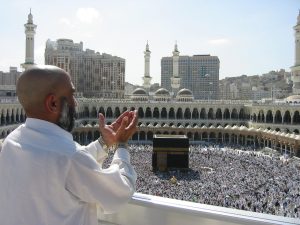
Pilgrim at Masjid Al Haram in Mecca, Saudi Arabia. The Saudi government has restricted travel to Islam’s holiest sites. Photo by Ali Mansuri, licensed under CC BY-SA 2.5
That factor ties many religions to the health crisis and rekindles old stereotypes.
In Italy, Elisa Di Benedetto reported: “Religious services, as well as church groups and any other activities and gatherings have been suspended in several parishes of Northern Italy this week. In Milan, tourist will not be able to visit the Duomo, Milan’s Cathedral, which was closed except for personal prayer, after the Archdiocese suspended Masses beginning in the evening of Sunday until further notice.”
In Saudi Arabia, the BBC reported, “The Saudi government said it would suspend visas for Muslims seeking to visit Mecca and Medina. Saudi Arabia has also suspended visas for tourists from countries with confirmed cases of the virus. It is not clear when the visa restrictions will be lifted or how Ramadan and the major Hajj pilgrimage – which begins in July – will be affected.”
In South Korea, where the outbreak centered around the small Shincheonji Christian sect. NPR reported, “Critics say the disease may have spread within the church quickly because of the way that it worships. ‘Shincheonji followers hold services sitting on the floor, without any chairs,” packed together “like bean sprouts,’ says Shin Hyun-uk, director of the Guri Cult Counseling Center, an organization in Gyeonggi province that works to extract members from the church. ‘A bigger problem is that they shout out ‘amen’ after every sentence the pastor utters, pretty much every few seconds. And they do that at the top of their lungs,’ sending respiratory droplets flying everywhere, he adds. These droplets are believed to transmit the coronavirus.”
In the Holy Land, pilgrimages from South Korea for Lent could be suspended, and Roman Catholics in several dioceses ares suspending the practice of taking consecrated wine from chalices.



















